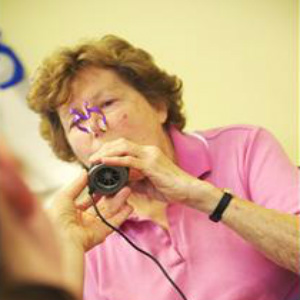GPs have seen ‘75,000’ patients following charity breathlessness campaign

A national campaign encouraging people to do an online breathlessness test led to 75,000 people making an appointment with their GP to get checked out, early results have shown.
The ongoing ‘Listen to your lungs’ campaign was set up by the British Lung Foundation (BLF) and started lasted July, with publicity urging people to go online and answer questions about how easily they get out of breath.
The campaign – which coincided for the first six months with the Government’s separate, but similar, respiratory symptoms campaign – has so far seen some 250,000 complete the online questionnaire, the BLF said.
A survey conducted on a sample of some 600 of those who completed the online questionnaire indicated that 30% – or around 75,000 people – had visited their GP as a result.
In addition, 8% – about 20,000 – said they had been sent for further tests by their GP or been diagnosed with a lung condition.
No detail is available yet on what specific conditions people had been diagnosed with or their outcomes, but the BLF said it wants to boost uptake further and raise awareness amongst GPs.
The charity has launched a new digital advertising campaign at bus stops, featuring hills and staircases and asking: ‘Does climbing leave you breathless? If ‘yes’, do something about it: breathless could be a symptom of a serious lung condition’.
Penny Woods, BLF chief executive, said: ‘We want the people in the UK who may have a lung disease but do not have a diagnosis – who feel breathless on a daily basis – not to dismiss it. Thousands of people have taken the test since we launched the campaign but we still want more people to take it and share the test with their friends and family. The more people we can encourage to talk about lung disease the better.’
Dr Noel Baxter, chair of the Primary Care Respiratory Society and a GP in south-east London, who helped develop the online questionnaire based on the Medical Research Council’s breathlessness scale, welcomed the findings.
Dr Baxter said: ‘We know from population studies (not healthcare) that 10% of adults have had daily disabling breathlessness for the last three months or more. Once you get to the older population, studies suggest 30% are dealing with breathlessness every day.
‘It’s no surprise, therefore, that there is an appetite for people to do this test. We know that refractory breathlessness is a predictor for increased healthcare utilisation and premature death but patients tend not to tell us about it until it’s too late.’
It comes as Cancer Research UK and Public Health England are in the process of analysing initial results from their own national respiratory symptoms campaign which ran from July to November last year.The campaign urged people to ‘tell your GP if you get out of breath doing the things you used to be able do’, alongside the original strapline from the national lung cancer awareness campaign which advised people to visit their GP if they have a cough lasting three weeks or longer.
The campaign previously came under criticism from GP leaders because the pilot had not yet been properly evaluated before being rolled out nationally.
Dr Andrew Green, GPC’s clinical and prescribing policy lead, said there were ‘benefits in proper assessment of new onset breathlessness, with early intervention in COPD being a case in point’ but added that he was concerned that the BLF had not co-ordinated with the GP profession and piloted it properly before national roll-out.
Dr Green said: ‘As independent organisations, charities don’t need to co-ordinate with anyone before spending their money.
‘The key here is proper piloting, with a comprehensive independent analysis of the benefits and the harms that can result before any national roll-out.’
Asked to comment on BLF’s campaign and how this would impact on evaluation of its own publicity campaign, Public Health England said in a statement: ‘We welcome the news that more people have taken action and been diagnosed, whether it is through BLF’s activity, ours, or a combination of the two.
‘The objective of the Be Clear on Cancer Respiratory Symptoms Campaign objective is the same as BLF’s – to increase early diagnosis of lung disease, including cancer and, because of this, it will not be possible to completely separate the impacts of the two campaigns.’
The statement added that ‘it will be difficult to disentangle its impact from other marketing activity run at the same time’ but that ‘it’s likely that the two campaigns will have worked together to amplify the overall impact’.
Pulse October survey
Take our July 2025 survey to potentially win £1.000 worth of tokens

Visit Pulse Reference for details on 140 symptoms, including easily searchable symptoms and categories, offering you a free platform to check symptoms and receive potential diagnoses during consultations.










